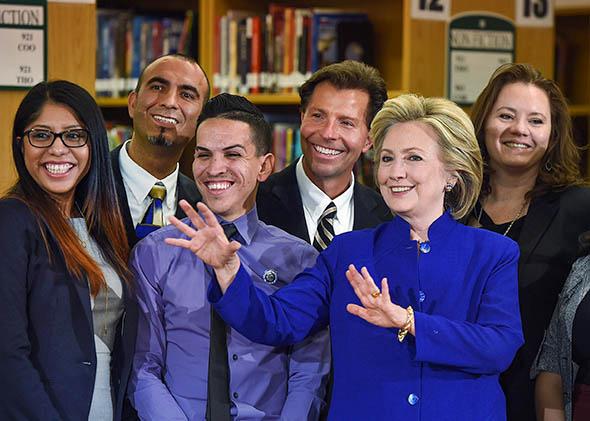For the second time in two weeks, Hillary Clinton has surprised progressives. Last week, in the aftermath of rioting in Baltimore, she gave a strong speech on criminal justice reform, endorsing body cameras and police reform, and calling for an end to mass incarceration.
On Tuesday, speaking to a group of DREAMers—unauthorized kids brought to the country as children—at a Nevada high school, she gave the same full-throated support to comprehensive immigration reform, going beyond President Obama—and activist expectations—to endorse changes to the immigration detention system, a path to citizenship for unauthorized immigrants, protections for children brought to the country illegally, and an expansion of the president’s executive order, meant to keep millions of unauthorized immigrants from deportation and give millions more the right to apply for work permits and other documentation. “The American people support comprehensive immigration reform not just because it’s the right thing to do,” Clinton said during the roundtable meeting, “but because it will strengthen families, strengthen our economy, and strengthen our country. That’s why we can’t wait any longer, we can’t wait any longer for a path to full and equal citizenship.”
This is a line in the sand. Hillary Clinton is for expansive immigration reform. And the implications—in policy and in politics—are huge.
First is the policy. Unlike Obama, who excluded large groups of unauthorized immigrants from his deferred action programs, Clinton wants to “do everything possible under the law to go even further” for large groups of people, including “many parents of DREAMers and others with deep ties and contributions to our communities.” Whether it’s possible is unclear; according to Obama’s Office of Legal Counsel, it’s illegal.* At the same time, such a move might fall within the “broad discretion” enjoyed by the executive branch on matters of immigration. Either way, it would mark a substantial change from the status quo.
Clinton also wants to reduce the number of vulnerable people in detention facilities, including children, LGBT individuals, and the elderly. “I’m very worried about detention, and detention facilities for people who are vulnerable and for children that I think we could do a better job if we kept attention to the people who have a record of violent, illegal behavior and that we have a different approach toward people who are not in that category,” she said. In practice, this means something like a probation system to ensure that immigrants appear at their court dates, and other alternatives to incarceration to protect people from sexual assault—an acute problem for LGBT immigrant detainees—and solitary confinement.
Second is the politics as it relates to Democrats. Clinton is already well-positioned with Latino voters. By tacking to the left of the president—and essentially giving immigration activists their core demands—she moves closer to rebuilding the coalition that elected Barack Obama in 2008 and 2012. As BuzzFeed declares, the Democratic presidential candidate has “won over much of the skeptical immigrant activist movement.” It’s hard to say how much this means for actual votes, but it’s significant. Latinos represent the majority of the net increase in eligible voters between 2012 and 2016. And in swing states like Colorado, Florida, Nevada, North Carolina, and Virginia, Latino voting populations have grown while white ones have declined. A stronger immigration stance doesn’t deliver Florida necessarily, but it might make it an easier reach.
Which leads us, finally, to how this relates to Republicans. According to the latest poll from NBC News and the Wall Street Journal, she leads both Jeb Bush and Marco Rubio with 66 and 63 percent support among Latinos versus 28 and 32 percent support, respectively. This isn’t far from Obama’s performance versus McCain in 2008 (67 percent to 31 percent) and Romney in 2012 (71 percent to 27 percent). The difference is that Bush and Rubio have a shot at improving the GOP’s position; they support some variation on immigration reform—with a strong emphasis on border security—and reject the more callous language of immigration hardliners. They may not reach George W. Bush’s success with Latino voters—polarization makes that difficult—but they can avoid the rock bottom of Romney.
As long as Democrats hovered near Obama’s position, Bush and Rubio could triangulate, offering a modest but serious alternative to Latinos who were dissatisfied with Democrats but didn’t want to sign on to a restrictionist agenda. In moving to Obama’s left, however, Hillary has changed the game. “Make no mistake,” she said during the roundtable, “Today not a single Republican candidate, announced or potential, is clearly and consistently supporting a path to citizenship. Not one. When they talk about “legal status,” that’s code for ‘second-class status.’ ”
Now, there’s a stark choice, between an expansive agenda of inclusion from the Democrats, and a more limited, hesitant approach from Republicans. Move in her direction, and the two Republican candidates face an angry conservative base. Try to move to the right, and they risk their appeal to Latino voters. It’s a tough spot, and they owe Clinton for the trouble.
With all of that said, there is a danger Democrats should consider, too. To secure older, whiter states like Michigan, Wisconsin, and Pennsylvania—much less win House seats and retake the Senate—Democrats need to improve with the white working class. Can Hillary appeal to working-class whites and embrace immigration reform, or will she spark a small backlash from whites who feel threatened by increased immigration? Will they see her, and Democrats, as indifferent to their concerns? Or does Hillary retain enough goodwill from her past political lives to improve on Obama’s performance?
If the answer is yes—if Hillary can tout immigration reform and improve with working-class whites—then we won’t just see a second President Clinton, we’ll also get insight into the last eight years. If it’s not policies that hurt Obama with working-class whites, then maybe it’s something a little uglier that caused them to back away from the Democratic Party.
Correction, May 8, 2015: This article originally misspelled the name of Obama’s Office of Legal Counsel. (Return.)
